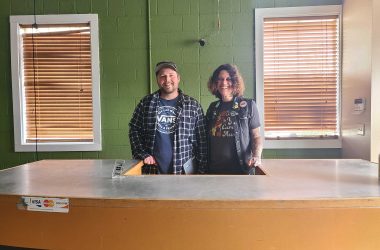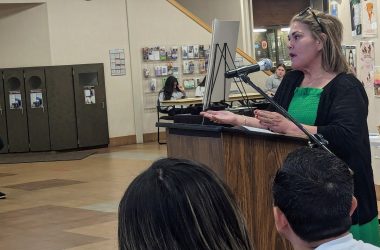 Gov. Kate Brown listens in during a phone call with Vice President Mike Pence and other governors on Monday, April 20. (Amanda Loman/Salem Reporter)
Gov. Kate Brown listens in during a phone call with Vice President Mike Pence and other governors on Monday, April 20. (Amanda Loman/Salem Reporter)
Gov. Kate Brown moved to blunt the rapid spread of Covid in Oregon using some of her sharpest language since the pandemic started, ordering new business shutdowns or restrictions, advising against travel and for the first time directing police to consider citing those who don’t follow social orders.
She pointed to sharply rising cases of the virus in Oregon and a dire situation for hospitals, particularly in the Portland area, where health officials reported only 15 intensive care unit beds were available yesterday.
“It’s a very dangerous situation and our hospitals are sounding the alarm,” Brown said. “Infection records are being set across the entire country. This means we cannot look to other states to share their staffing and hospital beds, because they too are experiencing the surge.”
The “freeze” Brown announced requires restaurants and bars statewide to offer only takeout, and closes gyms, museums, zoos, gardens and other indoor and outdoor event and recreation venues.
Document: Gov. Kate Brown’s statement
It will be in effect Nov. 18-Dec. 2, but Brown said counties that are “hotspots” of Covid should expect the rules to stay in place for at least four weeks. She named only Multnomah County as an example, but Liz Merah, Brown’s press secretary, said counties with more than 200 Covid cases per 100,000 residents over two weeks were likely to see the rules in place longer. Based on the most recent case numbers, that designation would include Marion County, but not Polk.
Earlier Friday, Brown also issued a travel advisory, calling on Oregonians to avoid leaving the state for recreation or tourism, and to self-quarantine at home for 14 days if they choose to travel. Governors Jay Inslee of Washington and Gavin Newsom of California issued the same advisory for their states.
The rules quickly drew negative reactions from business groups and trade associations across Oregon, who said Oregon Health Authority data has traced few outbreaks back to restaurants and other businesses who have followed health restrictions for months.
In a statement, Oregon’s chapter of the National Federation of Independent Business said the rules punish businesses who have followed the law and will drive people to socialize in private, where health rules are more difficult to enforce.
Brown’s announcement comes as Oregon has shattered Covid-related metrics in the past week. The state has recorded over 1,000 new cases of Covid two days in a row, with Marion County posting 656 new cases in the past week. Hospitaliations statewide have climbed from 217 one week ago to 303 Friday.
The situation is less dire at Salem Hospital, the flagship hospital for the mid-Willamette Valley, than in the Portland area, but local hospitals are also seeing a growing number of Covid-related hospitalizations.
Salem Hospital hasn’t yet stopped elective surgeries, a step three major Portland hospitals took earlier this week, but spokeswoman Leilani Slama said that may be necessary.
“We have triggers in place to identify when we take steps to curtail elective procedures. We have not reached that trigger as of yet. As with all things Covid related, we understand this is a rapidly evolving situation and we are prepared to take action quickly if needed,” Slama wrote.
The state also recorded 42 Covid-related deaths in the past week, a record since the pandemic began.
That includes the announcement Friday of a 38-year-old Marion County man who died with Covid on Nov. 6 at his residence, the youngest such death to date in Marion County. Health authorities said he did not have underlying health conditions but did not release other information about his illness or death, as is typical because of health privacy laws.
Brown and state health officials again told Oregonians social gatherings have been a key driver of rising cases because people who don’t realize they’re infected with Covid yet let down their guard around close friends and family.
The restrictions limit all private social gatherings to six people or fewer from no more than two households. Brown said that people gathering should still follow other health precautions, which include wearing masks when not eating or drinking and remaining physically distant.
Oregonians should begin heeding those rules immediately, she said, and she’s directed Oregon State Police Superintendent Terri Davie to work with local law enforcement agencies to enforce violations, which will be a misdemeanor punishable by up to 30 days in jail and a fine of up to $1,250.
“For the last eight months I have been asking Oregonians to follow the letter and spirit of the law and we have not chosen to engage law enforcement. At this point in time, unfortunately, we have no other option,” Brown said.
The orders mimic the original rules Brown put in place in March to slow the virus’ spread as the pandemic took hold in the U.S., but allows some activities that were stopped in the spring to continue under existing rules, including limited in-person schooling, youth programs, child care and outdoor recreation.
Brown acknowledged the order would come with a staggering economic cost and said blunting that impact will require action like the federal relief bill Congress passed in the spring.
‘It’s time for Congress to just do it and quit talking about it. Oregonians can’t wait,” she said.
The state’s epidemiologist, Dr. Dean Sidelinger, said the rapid rise in recent cases has strained the state’s contact tracing system, making it difficult to identify where Covid is spreading.
Oregon Health Authority has temporarily allowed county health departments to shorten interviews with people infected with Covid and prioritize reaching out to close contacts who are at high risk.
He likened the new rules to a “firebreak” but cautioned they would not immediately impact hospitalization rates because it takes time for people who have more serious cases of Covid to develop symptoms requiring hospitalization.
“Today’s hospitalizations reflect the cases from one to two weeks ago, when our case counts were significantly lower. So if cases continue to rise, you’ll continue to see a rise in people needing to be hospitalized,” he said.
RELATED COVERAGE
Businesses warn of closures as they prepare for new Covid restrictions
Contact reporter Rachel Alexander: [email protected] or 503-575-1241.
SUPPORT ESSENTIAL REPORTING FOR SALEM – A subscription starts at $5 a month for around-the-clock access to stories and email alerts sent directly to you. Your support matters. Go HERE.

Rachel Alexander is Salem Reporter’s managing editor. She joined Salem Reporter when it was founded in 2018 and covers city news, education, nonprofits and a little bit of everything else. She’s been a journalist in Oregon and Washington for a decade. Outside of work, she’s a skater and board member with Salem’s Cherry City Roller Derby and can often be found with her nose buried in a book.









